Videos
Oh, to be a baby aboard a Dutch bike…
Video Posted on Updated on
This delightful music video really made my morning. #
To be a baby aboard a Dutch bike is truly to be king of the world.
The song is so good that we can even overlook the Sturmey Archer gear shifter on the handlebars…
Enjoy!
Why should non-cyclists support measures to boost cycling?
Video Posted on Updated on
This article (Kaya Burgess – The Times) describes the multifarious benefits of investment in cycling for all sorts of different groups in the UK. In what follows below, I intend to summaries and illustrate just a few of these benefits.
Motorists, for instance, would benefit from fewer traffic jams and less conflict with cyclists. Even Top Gear presenter and general motor-mouth Jeremy Clarkson has praised cycling as a way of getting around. He last year described Copenhagen’s cycling culture as “fan-bleeding-tastic” and said: “Now I know that sounds like the ninth circle of hell, but that’s because you live in Britain, where cars and bikes share the road space. This cannot and does not work. It’s like putting a dog and a cat in a cage and expecting them to get along. They won’t, and as a result London is currently hosting an undeclared war. I am constantly irritated by cyclists and I’m sure they’re constantly irritated by me.”
People who commute by train and by bus will also benefit if more people took up cycling, as the intense pressure on the public transport system would be eased.
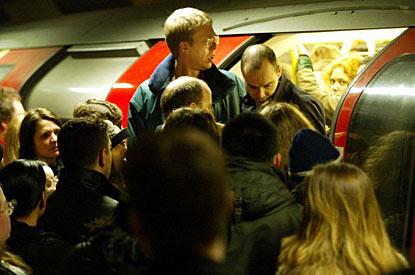
As child obesity soars in the UK, parents and children will benefit from better infrastructure as cycling to school becomes an option again. The more people who cycle, the safer the streets become, and thus more people will be encouraged to take up cycling . With more than 2/3 of car journeys in the UK being less than 5 miles, most of the driving that people do is completely unnecessary anyway. The school run needn’t be the stress that it has become.
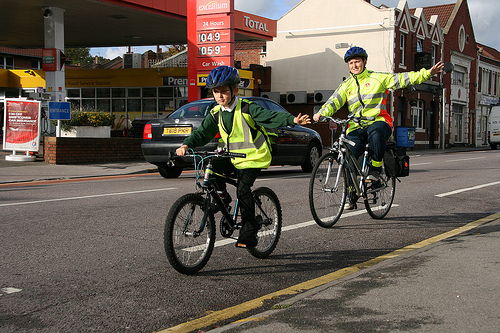
Ordinary adults will benefit from the regular exercise as well. Official advice recommends taking 150 minutes – or 2½ hours – of physical activity per week, but we do not always have the time – or inclination – to get down the gym or go for a jog after a long day or long week of work. Building cycling into a person’s daily routine is a brilliant way of nomalising the activity and incorporating exercise into their lifestyle.
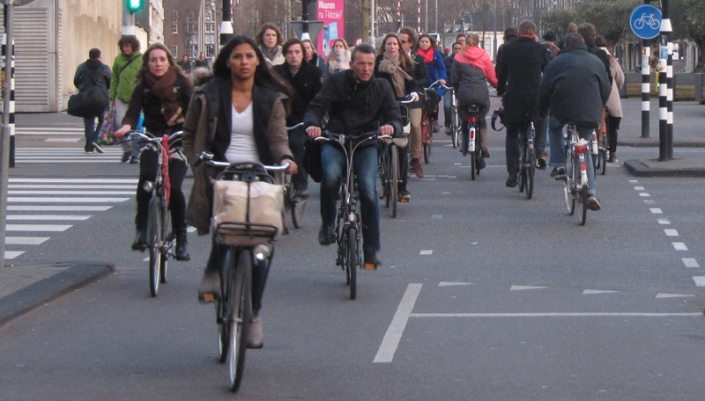
Taxpayers will also benefit from investment in cycling. The NHS spends around £5 billion each year on tackling preventable diseases exacerbated by inactivity, including type 2 diabetes, heart disease and strokes. Around £16bn is currently being spent on the Crossrail project in London and a further £3bn on upgrades to the A9 road in Scotland. Health experts told the Get Britain Cycling inquiry that investing in cycle provision is by far the most cost-effective form of transport spend, recouping £4 in healthcare savings for every £1 invested.
Investing in cycling is also good for businesses and employers. Not only does a manager get a healthier and more alert workforce, but research in New York has shown that the introduction of cycle lanes led to a 49 per cent increase in retail sales. In terms of parking, bikes take up a lot less space than cars, so it follows that bikes can carry more potential customers than cars can.
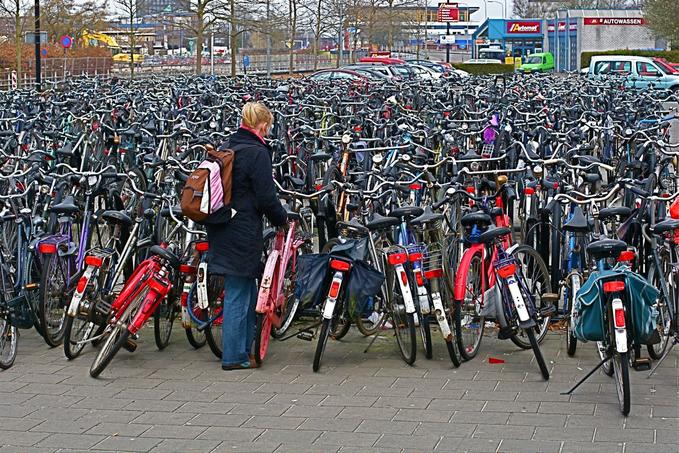
As a final point, the article notes that cyclists would also benefit from improved cycle infrastructure. It might seem like an obvious point, but around 2 per of traffic on Britain’s roads is made up by people on bikes, and as this figure grows the infrastructure will need to grow with it. For instance, of all vehicles crossing bridges over the River Thames in London at rush hour, more than half are bicycles – in spite of this fact the cycle lanes (which are shared and often blocked by buses) are at best only a third of a lane in width. It really is time the Government took cycling seriously.
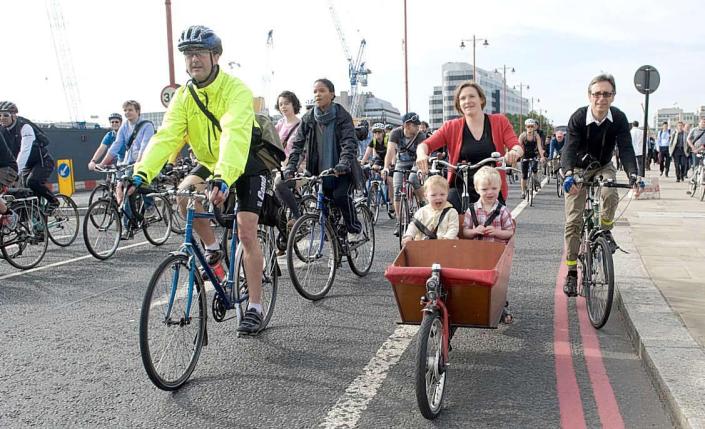
I really liked this article, but it did miss out some other key groups who would benefit from a more Dutch-style cycling infrastructure, as illustrated in the following video:
Dutch People on Bikes
Video Posted on
People in The Netherlands who ride bikes aren’t typically the same breed as the ‘cyclists’ of the UK; they’re just ordinary people who happen to ride bikes because it makes the most sense.
This short video contains some really rather ordinary footage of people riding bikes in Amsterdam. However, the video quality, editing, and backing music are all superb. Oh, and the fact that there is hardly a car in sight, that’s also superb.
Hitler the Road Nazi
Video Posted on Updated on
Hitler rants about bicycles and reacts to Premier Ted Baillieu’s recent remarks that the registration of bicycles is not feasible.
Nikki Sinclaire (West Midlands European parliamentarian) has echoed Hitler’s sentiment in calling for compulsory cycle registration and helmet use.
Cycle registration is a contentious issue, but to me it seems absurd for anyone to seriously suggest erecting such significant barriers to cycling at a time when there are too many cars on the roads and the nation’s health is so poor.
Some politicians seem to be under the impression that cyclists are anarchists who disregard the rules and their own safety for no particular reason. Although I don’t condone red-light jumping and pavement cycling (two of the most controversial issues), there are strong arguments and hard data in support of the fact that such behaviours are sometimes justified in light of their being the safest options at certain junctions. This being the case, what is perceived as the ‘bad behaviour’ of cyclists is symptomatic of the poor conditions that British bike riders have to put up; not only do we lack the strict liability laws employed to protect vulnerable road users across Europe, but our cycling infrastructure amounts to little more than inconsistent and unenforced dabs of paint.
If politicians like Nikki Sinclaire want people on bikes to behave better then maybe they should spend more time learning about how successful cycling cultures work and less time proposing preposterous new rules that do nothing to protect cyclists whatsoever.
Test your awareness
Video Posted on
An old psychology test seems to have been re-appropriated by TfL to show people how easy it is to overlook something that should be obvious.
A good test if you’ve not seen it before, though the link to cycling and driver awareness is questionable/tenuous at best
Transport Planners please take note
Video Posted on Updated on
Transport Planners please watch this.
Re-blogging this from a friend in NE Lincolnshire
The video shows some pretty dangerous situations that cyclists in the UK have to deal with on a daily basis.
Although the examples are pretty shocking, they are far from unusual.
I think the video speaks for itself and calls for better infrastructure to protect the most vulnerable road users.
The guy in the last shot was actually riding on one of London’s cycle super-highway, and clearly shows how a dab of blue paint on the road does nothing to protect people on bikes.
Look here to compare with how the Dutch deal with HGVs.
Added benefits of segregated cycle lanes
Video Posted on Updated on
Another masterpiece from our friends at NL Cycling.
It’s not just people on bikes who benefit from good infrastructure. Check out the video and see for yourself.
Nothing but good stuff
Dutchman isn’t impressed by London’s cycling infrastructure
Video Posted on Updated on
A brief analysis of cycling conditions in London from David Hembrow.
As a Dutchman, Hembrow highlights the shortcomings of British infrastructure that we have to live with. He makes the point that not only are the roads inadequate for cyclists, but that they aren’t really serving motorists much better either.
More than anything else, the thing that really struck me about this video was the shear volume of noise coming from the road. Motor vehicles make the urban environment a really unpleasant place to be.
Another video that focuses specifically on the shortcomings of London’s CS2 can be found here
Related articles
- London’s ‘cycling superhighways’ are ideal … for kamikazes | Charles Montgomery (theguardian.com)
- Cycle deaths leave London bewildered (bbc.co.uk)
- Upgrade London’s CS2 to Continental Standards – call to arms (dutchbikeguy.wordpress.com)
John Snow calls for improvements in cycling infrastructure
Video Posted on Updated on
http://www.bbc.co.uk/news/uk-politics-25046751
Veteran journalist John Snow is also an avid cyclist.
He has commuted by bike both to and from work every day for the last 40-odd years, and he raises some valid points about the dangers of riding a bike and the inadequacy of cycle safety provisions.
He talks about the probability of ‘big rewards’ for the first politician to re-draw the urban map and prioritise cyclists and pedestrians. In terms of combating obesity, reducing pollution, and making our cities more pleasant places to live, I think I can see why such a measure would be well received.
He states that, as humans, we respond to our surroundings. On the issue of cyclists who flout the law, the point he makes is that good behaviour will come when there are good provisions to protect and facilitate cycling. At the moment, it is a dog-eat-dog world out there on the roads; as the underdogs, cyclists are therefore put in a position of vulnerability, and have to make the most of their situation. Snow doesn’t condone bad behaviour on the roads, but he can at least appreciate why it happens.
Also of interest: http://www.bbc.co.uk/news/uk-25013438 and http://www.bbc.co.uk/news/uk-25014296
Related articles
- VIDEO: Snow’s verdict on dangers of cycling (bbc.co.uk)
- Cycling policy ‘getting better’ (bbc.co.uk)
The Myth of ‘Road Tax’
Video Posted on Updated on
This video is taken from the website ipayroadtax.com
It illustrates the sense of entitlement that motorists have because they *mistakenly* believe that they pay something called ‘Road Tax’.
The fact of the matter is, however, that road tax was abolished in 1937 by Winston Churchill. The tax-disc that motor vehicles are required to display in their wind-shield is actually there to show that drivers have paid their Vehicle Excise Duty (VED), which is a tax related to the emissions that their vehicle produces – this is why low-emissions vehicles such as Smart cars, electric cars, G-Wiz etc. don’t pay this tax.
Just to be clear, VED does not pay for the roads. The roads are paid for through general taxation and therefore everyone has an equal right to use them. Another good (short) video about this can be found here. I’m posting this primarily because it’s getting boring having to explain it so often.
Some drivers mistakenly believe that ‘Road Tax’ entitles them use their vehicles to bully people on bikes, and this leads to some pretty disturbing behaviour, as can be seen in the following video:
Some rather cheeky and ingenious bikers think that, actually, maybe cyclists SHOULD pay VED based on their emissions, and they have come up with some very compelling reasons why this would not be such a bad thing. A link to their reasoning can be found here, but the gist of their argument is summarised by the graph below
Related articles
- Is there any such thing as ‘road tax’? (themexicanpost.wordpress.com)
- http://www.bbc.co.uk/news/magazine-23694438
- http://www.thetimes.co.uk/tto/public/cyclesafety/article3311131.ece
- http://www.theguardian.com/environment/bike-blog/2011/nov/22/cycling-road-tax-confused
- https://www.eta.co.uk/2013/05/24/more-cyclists-pay-road-tax-than-car-drivers/

